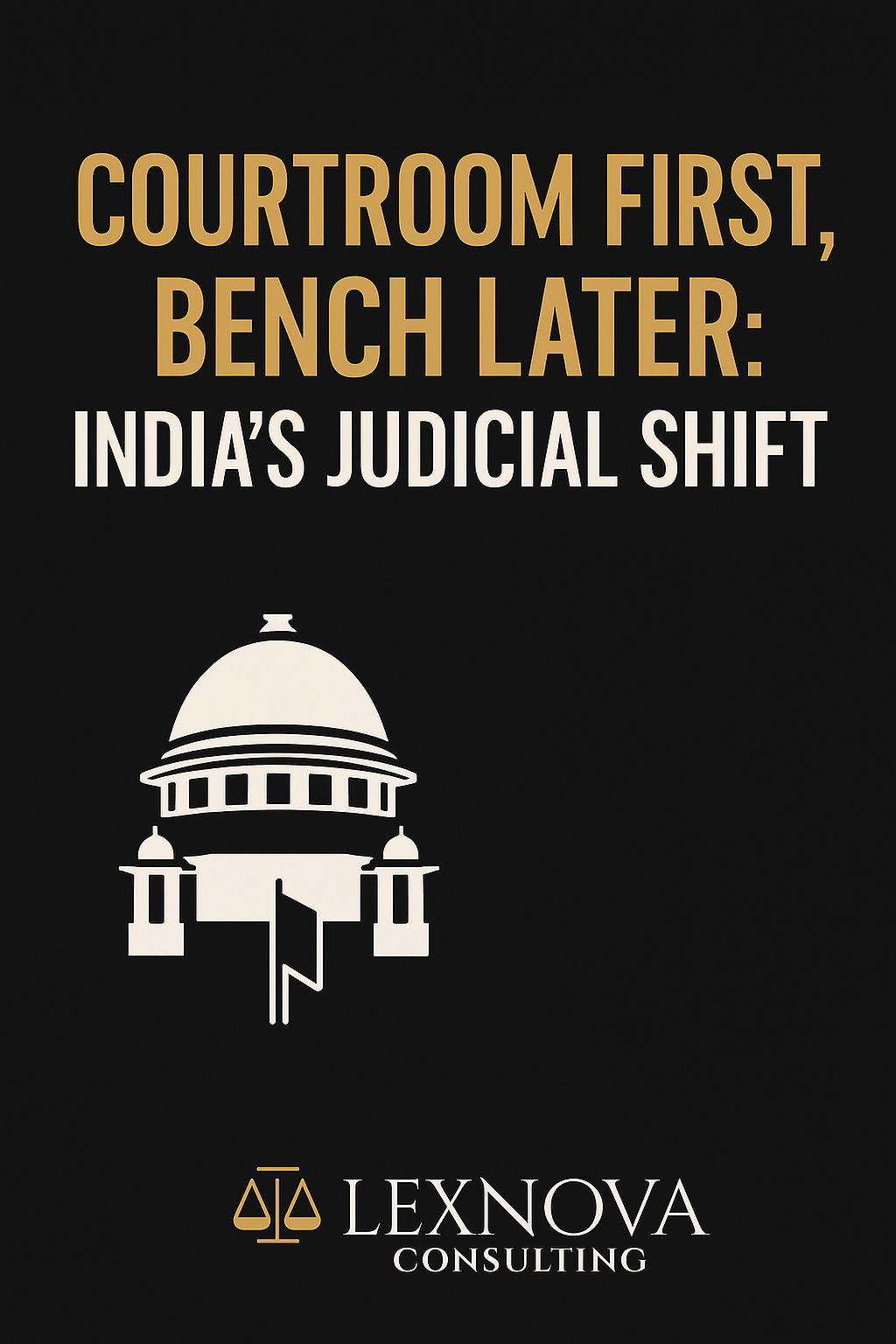Introduction
In a significant judicial reform, the Supreme Court of India, on May 20, 2025, revived the 3-Year Practice Rule, making it mandatory for all candidates aspiring to become Civil Judges (Junior Division) to have at least three years of real-world legal practice before applying. This blog breaks down the 3-Year Practice Rule, explains who it affects, and how it reshapes judicial service eligibility in India.
This judgment, delivered by a constitutional bench, seeks to enhance the integrity and competence of the subordinate judiciary by ensuring candidates possess sufficient exposure to courtroom processes, client interaction, and legal ethics — all of which are crucial in judicial decision-making.
Read about the Supreme Court Judgment Here
Background of the 3-Year Practice Rule
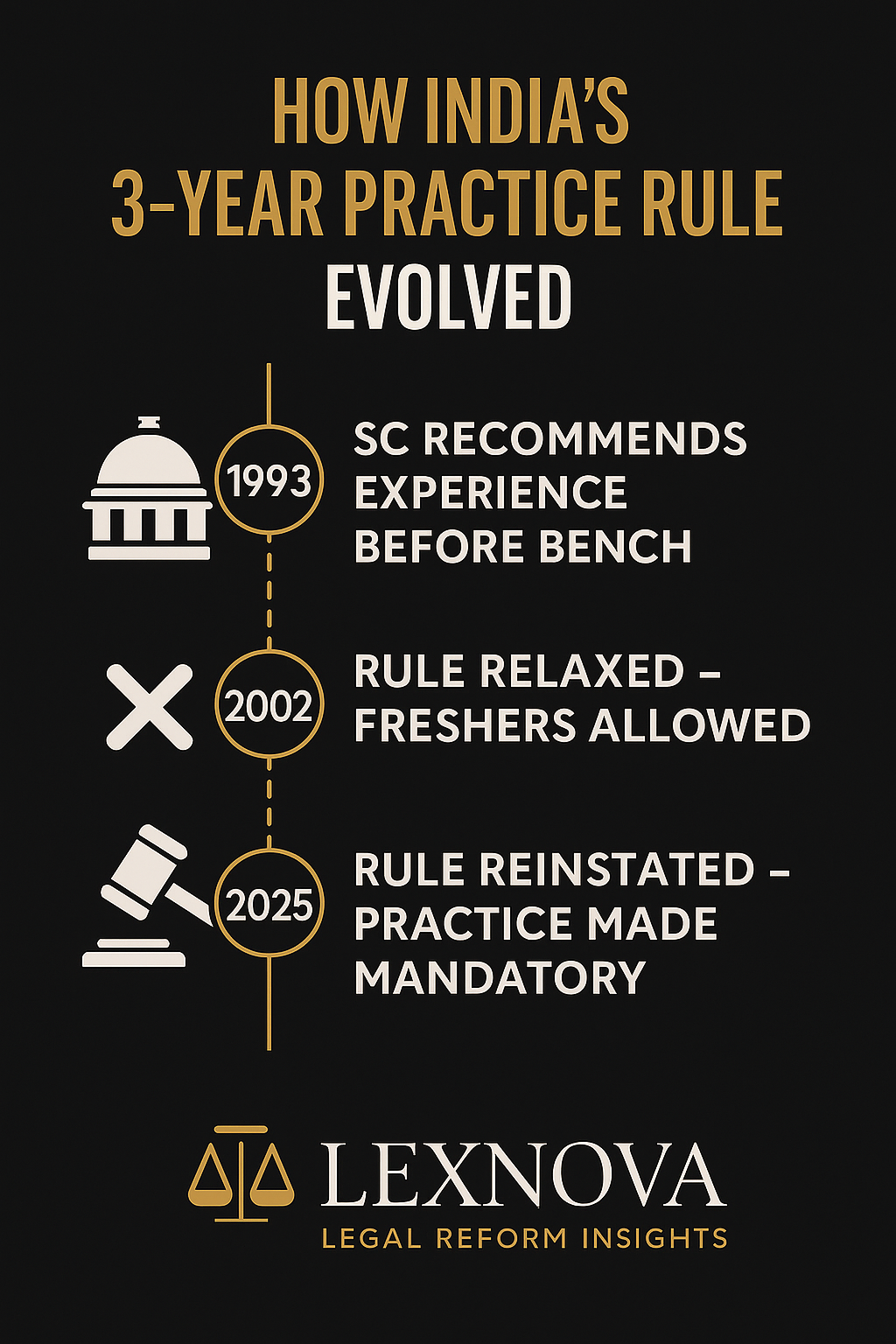
The 3-Year Practice Rule has a long history rooted in the Supreme Court’s ongoing effort to reform the lower judiciary:
| Year | Development |
|---|---|
| 1993 | The Supreme Court in All India Judges’ Association v. Union of India recommended three years of mandatory practice before a lawyer could apply for judicial services. |
| 2002 | The requirement was relaxed to allow fresh law graduates to appear directly in state judicial service exams. Many states like Delhi, Madhya Pradesh, and Bihar adopted this relaxed standard. |
| 2025 | The Supreme Court, in a fresh ruling, reasserted the 3-year practice requirement, citing the need for professional maturity and courtroom awareness before one assumes a judicial position. |
Read also: BCI Opens the Doors: Can Foreign Lawyers Now Practice in India?
Details of the Supreme Court Judgment
Case: All India Judges Association v. Union of India
Bench: Chief Justice B.R. Gavai, Justices A.G. Masih, K. Vinod Chandran
Date of Judgment: May 20, 2025
Citation: Writ Petition (C) No. 1022 of 1989
Key Directives by the Court:
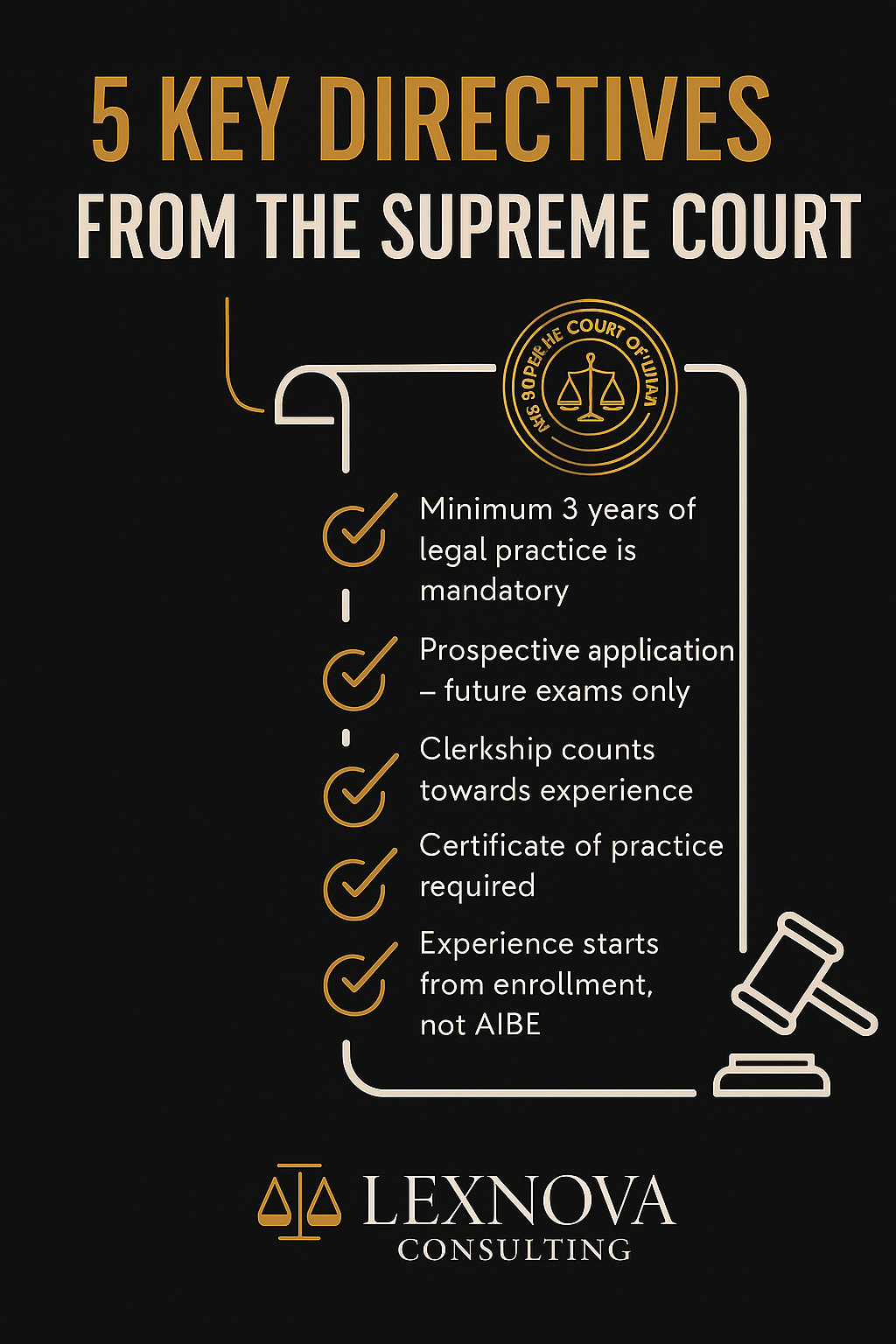
- 3 years of practice is mandatory before applying for civil judge posts.
- Rule applies prospectively, not to exams already advertised.
- Law clerkship or equivalent legal experience counts towards the 3-year requirement.
- A Certificate of Practice must be issued by a Principal Judicial Officer or a senior advocate (10+ years of experience).
- The start date of experience is calculated from provisional Bar Council enrollment, not from the date of passing the AIBE.
“The quality of justice dispensed in the lowest courts must not be compromised for expediency. Real-world experience tempers youthful zeal with legal wisdom.” — Para 42, SC Judgment, 2025
Legal Reasoning and Article 233
The judgment rests heavily on the constitutional vision outlined in Article 233 of the Constitution of India, which governs judicial appointments:
“Appointments of persons to be, and the posting and promotion of, district judges in any State shall be made by the Governor… in consultation with the High Court.”
The Court held that although Article 233 directly addresses district judges, its spirit applies to all judicial tiers, emphasizing consultation with the High Court and the expectation of legal maturity.
“The Bench finds it inconceivable that a candidate who has never stood in court could responsibly adjudicate its most foundational disputes.” — Para 44, SC Judgment
The 3-Year Practice Rule reinforces the judiciary’s need for real-world experience as a constitutional necessity. The judges agreed that courtroom competence, procedural familiarity, and exposure to advocacy are prerequisites for meaningful judicial functioning — especially at the trial court level.
Who Will Be Affected?
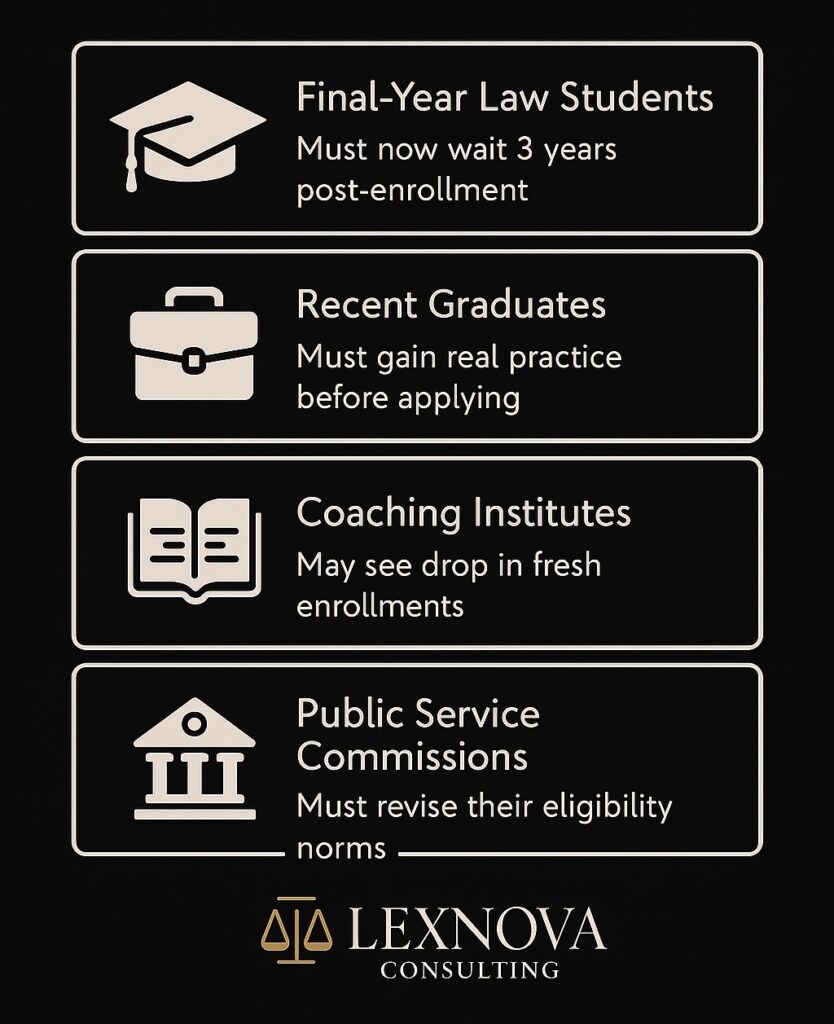
| Group | Impact |
|---|---|
| Final-year law students | Will now need to wait 3 years post-enrollment to become eligible. |
| Recent law graduates | Will have to gain practical experience before appearing in state exams. |
| Judiciary coaching centers | May see lower enrollments from first-time graduates in the short term. Judiciary coaching centers must now adapt their programs to align with the 3-Year Practice Rule. |
| State Public Service Commissions | Will need to update eligibility requirements for all future notifications. |
“This changes everything. I was planning to apply for the Delhi Judicial Services this year. Now I’ll have to gain proper courtroom experience first — which might actually help me grow.”
— Kriti Mehta, final-year law student, New Delhi
This change affects states like Delhi, MP, UP, Bihar, Rajasthan, and others where no such requirement existed until now.
Expert Commentary and Reactions
Bar Council of India supported the decision, calling it a “step towards improving judicial accountability.”
High Court registrars in various states have welcomed the ruling, citing instances of poor performance by judges without courtroom experience.
Senior Advocate Arvind Rao, quoted in The Hindu, noted:
“This ruling will push young lawyers to genuinely engage with the system — and that can only be good for India’s legal fabric.”
Outlink: LiveLaw analysis of the ruling
How Does India Compare to Global Standards?
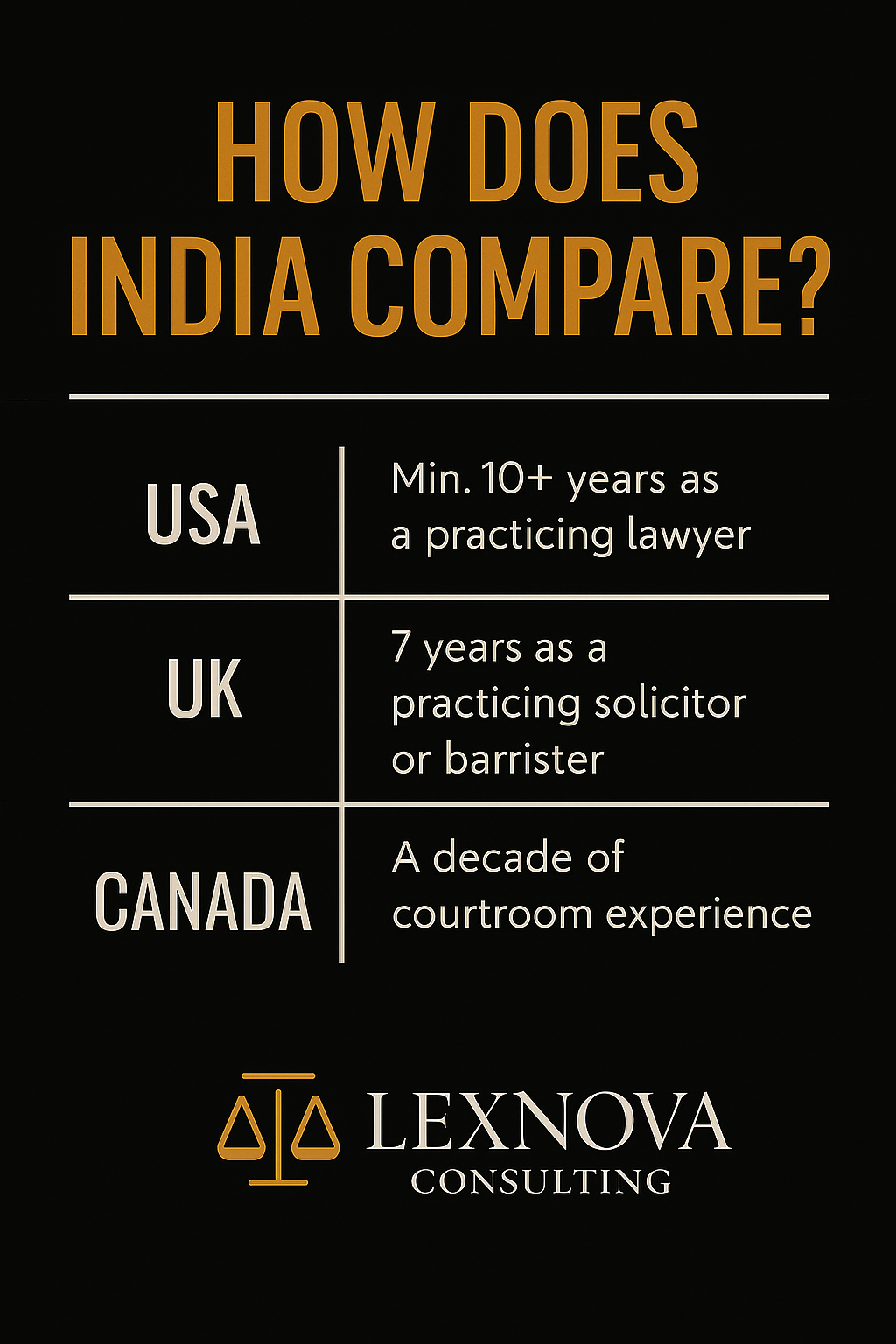
| Country | Eligibility Requirement |
|---|---|
| India (Now) | 3 years of practice (mandatory) |
| United States | 5–10 years of legal experience, varies by state |
| United Kingdom | 5+ years legal experience + JAC qualification |
| Canada | 10 years of legal practice (standard) |
India now aligns with countries that treat the judiciary as a seasoned profession — not an academic extension.
Conclusion: Why the 3-Year Practice Rule Marks a Judicial Turning Point
The Supreme Court’s 2025 judgment is a paradigm shift for India’s judiciary. By restoring the 3-Year Practice Rule, it prioritizes legal maturity over theoretical readiness, making the judiciary more prepared to tackle real-world cases from Day One.
The reform is not without its challenges — it extends the journey of every aspiring civil judge. However, the judiciary is not merely a job — it is a constitutional duty. And for that, experience is indispensable.
Upcoming Blog You Might Be Interested In:
- SC Mandate for 3 Years of Practice: Impact on State Judicial Exams
(These will be added to our blog archive soon.)
Frequently Asked Questions (FAQs)
-
Is this rule applicable to all states?
Yes. The 3-Year Practice Rule introduced by the Supreme Court applies uniformly across India unless a state specifically legislates otherwise.
-
Does it affect judiciary exams already notified?
No. The rule applies only to future notifications issued after the May 20, 2025 judgment.
-
Does clerkship or internship count?
Law clerkships can be counted toward the 3-Year Practice Rule, but not internships or purely academic research work.
-
What is a valid Certificate of Practice?
It must be signed by a Principal District Judge or a senior advocate (10+ years) verifying your active involvement in court.
-
From when is the 3-year practice counted?
From the date of provisional enrollment with your State Bar Council — not AIBE clearance.
Disclaimer: This article presents a legal and policy analysis based on the Supreme Court’s May 2025 judgment and publicly available information. It is intended for educational and informational purposes only and does not constitute legal advice. LexNova Consulting does not make any allegations or representations against any institution or authority.
Contact Us
Need clarity on how this ruling affects your career plans?
LexNova Consulting Can Help
We assist judicial aspirants, law graduates, and academic institutions with:
- Eligibility evaluations
- Career roadmaps
- Drafting Certificates of Practice
- Strategic preparation guidance
👉 Contact Us Here
or
👉 Fill Our Quick Form
You’ll hear from us within 24 hours.

